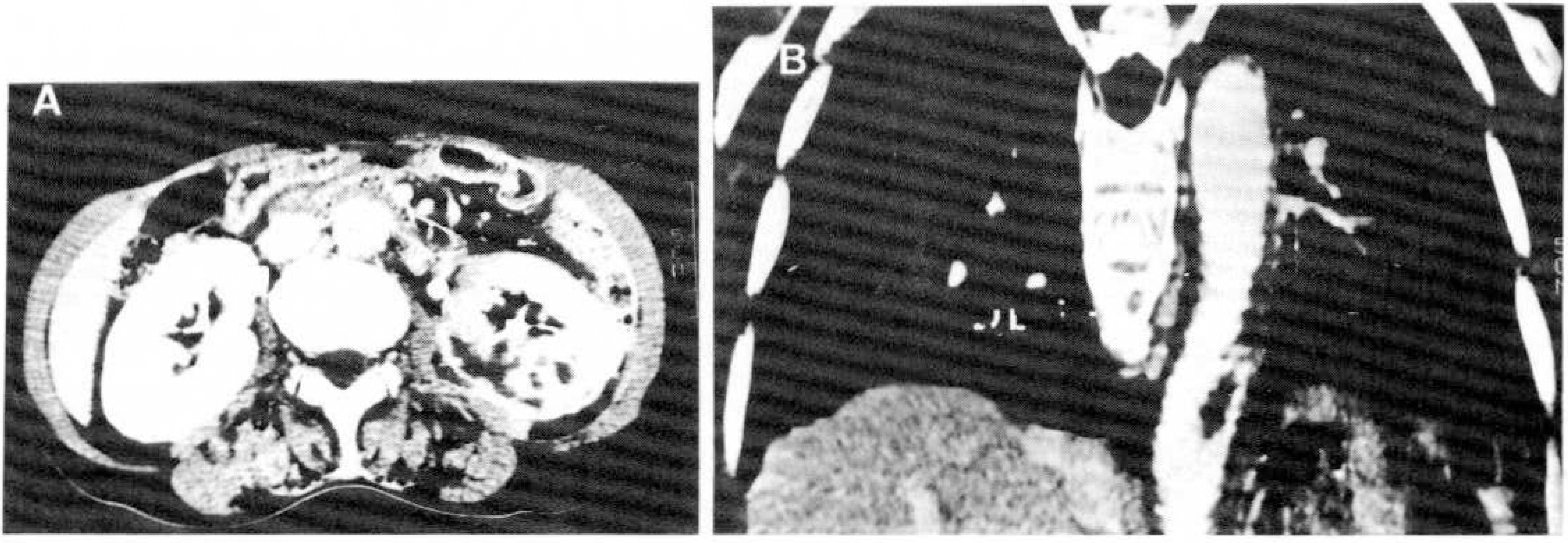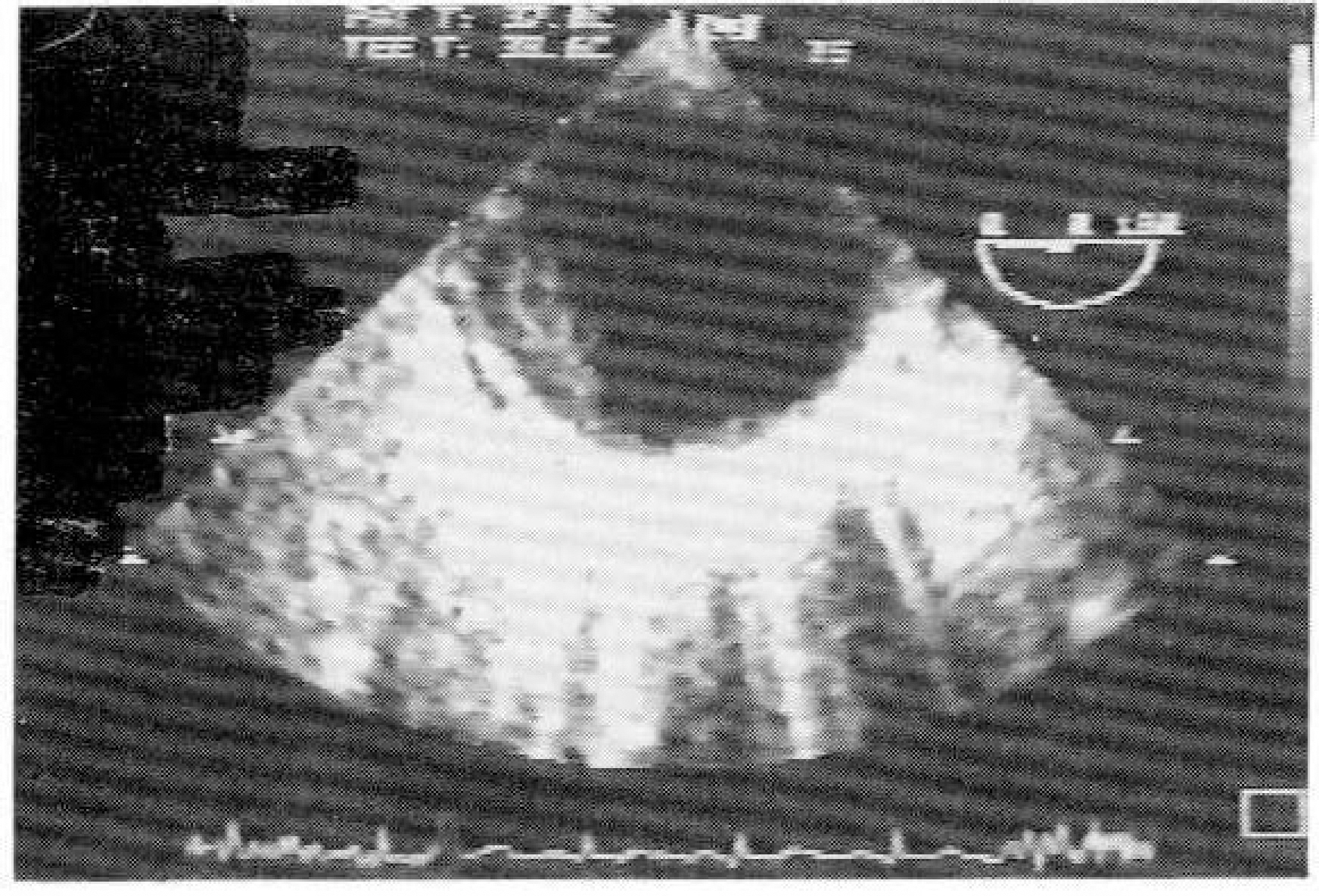J Korean Soc Echocardiogr.
1995 Jul;3(1):23-26. 10.4250/jkse.1995.3.1.23.
Recurrent Systemic Embolizetion Caused by Aortic Thrombus in Antiphospholipid Antibody syndrome: A Case Report
- Affiliations
-
- 1Department of Internal Medicine, Seoul National University, College of Medicine, Seoul, Korea.
- 2Department of Internal Medicine, Asan Medical Center, University of Ulsan, Seoul, Korea.
- KMID: 2410428
- DOI: http://doi.org/10.4250/jkse.1995.3.1.23
Abstract
- Antiphospholipid antibody syndrome is characterized by recurrent fetal loss, neurologic dysfunction, arterial and venous thrombosis, and systemic and pulmonary hypertension associated with antiphospholipid antibodies. We observed a large visible thrombus in the descending aorta leading to multiple systemic embolism in a patient with antiphospholipid antibody without other risk factors for thrombosis. We assume that this thombus is associated with antiphospholipid antibody syndrome.
MeSH Terms
Figure
Reference
-
References
1). Mitusch R, Stierle U, Tepe C, Kummer P, Kessler C, Seikhzadeh A. Systemic embolism in aortic arch atheromatosis. Eur Heart J. 15(10):1373–80. 1994.
Article2). Aldrich HR, Girardi L, Bush HL, Dedevereux RB, Rosengart TK. Recurrent systemic embolization caused by aortic thrombi, Ann Thorac Surg. 57:466–8. 1994.3). Sharifi M, Sorkln R. Lakier J, Chaitra S. Thoracic aortic thrombosis as a cause of bowel ischemia: A case report, Angiology. 45(11):973–7. 1994.4). Josephson GD, Tiefenbrun J, Harvey J. Thrombosis of the descending thoracic aorta: A case report. Surgery. 114:598–600. 1993.5). Machleder HI, Takiff H, Lois JF, Holburt E. Aortic mural thrombus: An occult source of arterial thromboembolism, J Vasc Surg. 4:473–8. 1986.6). Tunick PA, Perez JC, Kronzon I. Protruding atheromas in the thoracic aorta and systemic embolization. Ann Intern Med. 115:423–7. 1991.
Article7). Karalis DG, Chandrasekaran K, and Victor MF Ross JJ, Mintz GS. Recognition and embolic potential of intraaortic atherosclerotic debris. J Am Coll Cardiol. 17:73–8. 1991.
Article8). Wasserinann A. Neissr A, Bruck C. Eine serodiagnostische reaktion bei syphilis. Dtsch Med Wochenschr. 32:745–46. 1906.
Article9). Conley CL, Hartmann RC. A hemorrhagic disorder caused by circulating anticoagulant in patients with disseminated lupus erythematosus. J Clin Invest. 31:621–22. 1952.10). Meyer O, Cyna L, Bourgeois P, Kahn MF, Ryckewaert A. Profile and cross reactivities of antiphospholipid antibodies in systemic lupus erythematosus and syphilis. Clin Rheumatol. 6:369–77. 1987.11). Meyer O, Piette JC, Bourgeois P. Antiphospholipid antibodies: A disease marker in 25 patients with autoimmune antibody negative SLE. J Rheumatol. 14:502–06. 1987.12). Manoussakis MN, Gharavi AE, Drosos AA, Kitridou RC, Moutsopoulous HM. Anticardiolipin antibodies in unselected autoimmune rheumatic disease patients. Clin Immunol Immunopathol. 44:297–307. 1987.
Article13). McGee GS, Pearce WH, Sharma L, Green D, Yao JS. Antiphospholipid antibodies and arterial thrombosis: Case reports and a review of the literature. Arch Surg. 127:342–6. 1992.14). Ordi RJ, Perez PP, Monasterio J. Clinical and therapeutic aspects associated to phospholipid binding antibodies. Haemostasis. 24(3):165–74. 1994.
- Full Text Links
- Actions
-
Cited
- CITED
-
- Close
- Share
- Similar articles
-
- Recurrent Ischemic Stroke by Carotid Free-Floating Thrombus in Patient with Antiphospholipid Antibody Syndrome
- A patient with chorea associated with hyperthyroidism and primary antiphospholipid antibody syndrome
- A Case of Leukocytoclastic Vasculitis Associated with Antiphospholipid Antibody Syndorme
- Flank ulcer in a patient with primary antiphospholipid syndrome
- Primary Antiphospholipid Antibody Sy n d rome with Adrenal Hemorrhage in a Child: A Case Report




